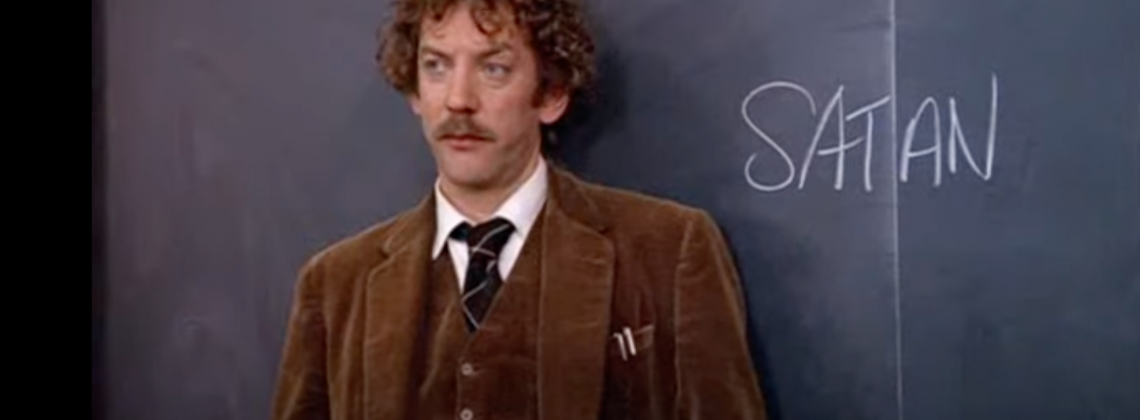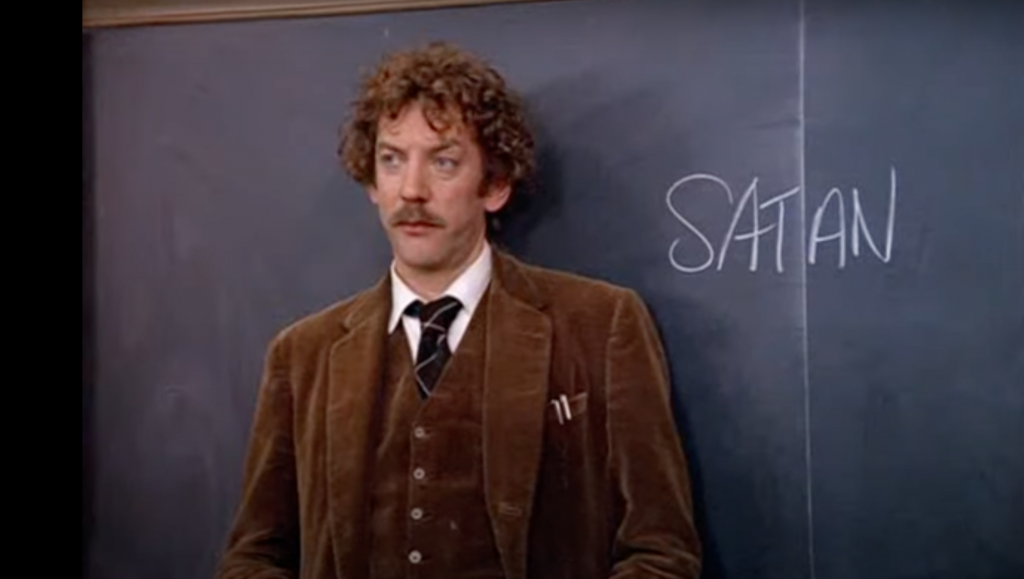

In which a young man discovers that the brain was not made to live in a silo
Upon realizing that I participated in exactly zero activities that render any good whatsoever to my fellow man, I reluctantly decided to enroll in college in an attempt to find some.
To reveal my alma mater here would be detrimental to this publication and, likely, to my person, taking into account a particular point—on the surface a frivolity but, in actuality, a reality planted as deep in the cultural soil as religion. I live and write in the southeastern United States, where collegiate sporting rivalry is well encapsulated thusly: A man may die and be buried in his University of Alabama colors. Upon deliverance to the threshold of Heaven this same dead man would immediately notice, standing just beyond the Pearly Gates, the unmistakable presence of the Divine. But, were he also to spy the Divine clad in the University of Tennessee’s colors this same dead man, a Christian all his life, would turn smartly on his heel and opt for hell. If the University of Florida, Ole Miss, The University of Georgia, Auburn, and, to a lesser degree, Florida State were interchanged in any order with the universities referenced above it would produce the exact same results.
Until I went to college I had always believed there was nothing I could learn in the halls of academia that wouldn’t be better gleaned from conservative AM talk radio, church or, more peripherally, the Bible. In that order. If information could not be found in one of these places it was, as I’d always understood, not real. Not that it was information to be disputed on any ideological or practical plane. It was nil, an empty set, less than zero, and fodder for contempt. Everything that stormed my ears from my family’s old Philco, from the preacher’s throat, or from a casual riffling of my worn King James automatically nullified anything sourced beyond these parameters. And for those times Rush Limbaugh’s barking lay in stark contrast to Biblical ideals rectification was simple: In church, give the church answer. Elsewhere, quote Rush. I’d never felt, up to that point in my young life, any tension from the contradictions between right-winged hellfire and the Word of God. They seemed to occur infrequently anyhow.
My father shook my hand the morning I drove off in the direction of higher education. His grip was much tighter than it normally would have been. Before he let my hand go he pulled me close and said, with all the sorrowful earnestness of a general who has lost a war, “Your professors. They’ll spring their secret liberal agendas on you. Old earth and abortion and gays and critical race theory and evolution. All of it. Be true, son. Be true.” Then he thumped me on the chest and bowed his head and said no more.
Dr. Smith was the beleaguered professor at the helm of my English composition course. Smith did not appear as I expected: clad in a corduroy earth-toned sport coat with contrasting elbow patches, hair handsomely disarrayed. Instead, he presented himself in a rumpled mis-buttoned button-down, half-tucked into a pair of blue—or what had once been blue—jeans. Not to mention tennis shoes whose alternate purpose must have been creek stomping. I raised my hand and requested a private audience at the conclusion of class, which he granted and, in his office some fifty-one minutes later I wasted no words. “I am familiar with your secret liberal agendas,” I declared. Then, I sat back in the folding chair Smith had afforded me, the only other piece of furniture besides his desk and his chair that his office could accommodate.
“Which ones?” Smith asked.
“All of them,” I replied, “Old earth and abortion and gays and critical race theory and evolution. To name a few.”
At this Smith fell out of his chair. When he regained his seat he cleared his throat and said, “It is true that I have an agenda. However, it is not a secret. It is this: That you and your fellows should be able to write a complete and cogent sentence. Just one. Subject, predicate. An idea conveyed, in writing, using only a logical succession of words. ‘The fisherman caught a fish.’ You see?”
I made no immediate reply.
“Bully for all of us if you and your fellows were to learn how to gussy up the sentence with appropriate descriptors. ‘The fisherman caught a wet fish.’ Like that, you see?”
My eyes flitted around Smith’s office. His degrees, at least ten of them, hung in frames that had been, apparently, cobbled together in art class by his children. There was a small fan of an old sort, made of metal, whose blades were so bound by spiderwebs that were Smith to turn it on nothing would happen. Most of his books were stacked in lopsided piles on the floor. I noted then that for any class in which he failed to appear I should assume burial by biblio-avalanche. I wondered where I might find a St. Bernard.
“So that I am clear,” I finally said, “You are saying that you are not going to, for example, try to convince me that the earth is four and one-half billion years old?”
“No. This is an English class.”
“Or to get an abortion?”
“You? My good . . . man?”
“Yes.”
“Impossible. Though I recommend you enroll immediately in an anatomy class.”
“Or to marry another man?”
“Sir, it is not my business whether you marry a man or a woman or enter the priesthood.”
At that I stood and shook Smith’s hand and we parted company amicably. And though winter break—that interlude my father referred to as, “CHRIST,” and here he usually paused a full five seconds before pronouncing, “mas break,” — would eventually arrive and I would go home again, I decided not to discuss this conversation with him. To him, it would only sound like Smith had tried to turn me into a Catholic.
Paul Luikart is the author of the short story collections Animal Heart (Hyperborea Publishing, 2016), Brief Instructions (Ghostbird Press, 2017), Metropolia (Ghostbird Press, 2021) and The Museum of Heartache (Pski’s Porch Publishing, 2021.) He serves as an adjunct professor of fiction writing at Covenant College in Lookout Mountain, Georgia and lives in Chattanooga, Tennessee.
The ending is perfect!
Though I’d frankly prefer that your professor also teach you how to write a paragraph.
A curious post.
The narrative is fanciful and anachronistic.
Perhaps it was intended as cynical satire, but it fell flat.